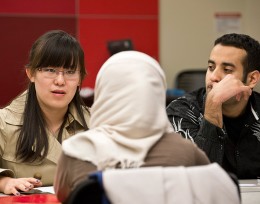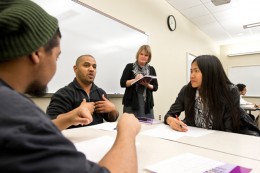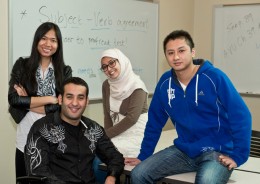
Students discuss current news topics in a Learning English for Academic and Professional Purposes 4 Advanced Academic Success course.
Every class day is an international event in Wright State University’s Department of English Language and Literatures, which offers myriad opportunities to students interested in learning English as a second language and teaching it.
The largest group of students is served by the non-credit Learning English for Academic and Professional Purposes, or LEAP. With 170 students currently enrolled, LEAP provides full-time intensive English instruction and helps non-native speakers develop the linguistic, academic and social skills they need to be successful at an American university.
Students in the program are placed into five “levels” depending on their abilities to read, write and speak English.
Sujitra Namdee, an M.B.A. student from Thailand, said LEAP classes have helped her improve her grammar and language skills. “We can practice a lot here,” she said. “It’s better because all of us as international students, we don’t feel as nervous because we are learning. We’re all learning. So we don’t feel embarrassed.”
Students said the program also helps them develop important study skills. “We talk about how to be successful at the university,” said Dalal Felemban, a graduate student from Saudi Arabia.
“I learned how to solve my problems by myself. Don’t depend on other people to do it,” said Abdulrahman Alowaimer, an undergraduate student from Saudi Arabia.

Jeannette Horwitz, LEAP director and English lecturer, listens as students in her LEAP 4 Advanced Academic Success course discuss current news topics.
LEAP student say the program also helps them learn more than English. They are especially interested in learning more about the different cultures of their classmates and of the United States.
Jeannette Horwitz, the director of LEAP and lecturer of English, said the program emphasizes the need to “go beyond the book” to help students learn.
During February, LEAP level three students read about different types of education, and instructors invited area homeschooling families to meet with the classes, encouraging interactive learning that benefitted both the international students and the homeschooled children.
“We have done this at least three times in the past,” Horwitz said, “and it’s always a hit with everyone involved.”
In addition, level two students participated in “Food Day,” during which they created PowerPoint presentations demonstrating how to cook a dish from their native countries. Both the presentations and food samples were shared with about 50 students and teachers.
Students who are ready to take English for academic credit enter the English as a Second Language (ESL) program. Robert Rubin, ESL program director and senior lecturer of English, said the program offers five sections of English 1100 for ESL students and two sections of English 1030, the ESL basic writing course. This spring, 130 students are enrolled in ESL courses.
“Just a few short years ago, we offered one moderately enrolled speaking class and two writing classes each term,” Rubin said. “We now offer the speaking class with full enrollments, and registration in our writing classes is through the roof.”

L to R: Sujitra Namdee, Abdulrahman Alowaimer, Dalal Felemban and Jizhe Zou are taking the LEAP 4 Advanced Academic Success course.
While both LEAP and ESL classes are open to speakers of any language, the majority of students have recently been from Saudi Arabia, China and India. Academic classes have also seen an increase in Brazilian students studying pharmacology and toxicology. They are typically on campus for a semester or a year before returning to Brazil to finish their degrees.
Teachers for these and similar programs are trained as ESL teachers by a small group of faculty who specialize in Teaching English to Speakers of Other Languages. Led by Chris Hall, Ph.D., these professors offer graduate and undergraduate classes leading to certificates and degrees that qualify Wright State students to teach English in school, college and public settings.
International internships are available, and demand for ESL teachers is high, Hall said. Not limited to English majors, these credentials can lead to employment for students in other fields as well.
Internships in Japan are available to students in the TESOL program, while special internships are offered to M.A. TESOL students at Dalian Technology University in China. Graduates of the TESOL master’s program have found jobs in two-year and four-year colleges and in intensive English programs around the United States, Hall said.
TESOL certificates and the TESOL master’s degree are not limited to English majors. For instance, the Teaching English as a Foreign Language certificate program, which is offered every summer on campus, is open to all Wright State students and people the community. TEFL students have found teaching jobs in France, Japan, China, Thailand, Columbia, Namibia and South Africa.

 Wright State’s Homecoming Week features block party-inspired events Feb. 4–7 on the Dayton Campus
Wright State’s Homecoming Week features block party-inspired events Feb. 4–7 on the Dayton Campus  Wright State music professor honored with Ohio’s top music education service award
Wright State music professor honored with Ohio’s top music education service award  Wright State’s Industrial and Human Factors Engineering program named one of top online graduate programs by U.S. News
Wright State’s Industrial and Human Factors Engineering program named one of top online graduate programs by U.S. News  Student-run ReyRey Café celebrates decade of entrepreneurship at Wright State
Student-run ReyRey Café celebrates decade of entrepreneurship at Wright State  Wright State faculty member Damaris Serrano wins Panamanian literary award
Wright State faculty member Damaris Serrano wins Panamanian literary award 